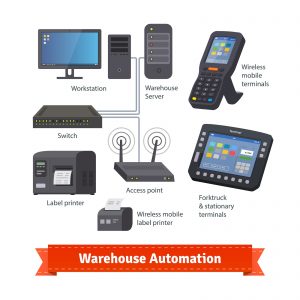5 Supply Chain & Warehousing Trends To Watch For In 2020
Why Warehouse Management Matters For Your Business
 Cloud and Mobile technologies are already causing a buzz in supply chain management, making the discussion about future trends worthwhile. Digitization of the supply chain and warehousing is saving companies significant time, bringing more efficiency, and ultimately reducing operational cost.
Cloud and Mobile technologies are already causing a buzz in supply chain management, making the discussion about future trends worthwhile. Digitization of the supply chain and warehousing is saving companies significant time, bringing more efficiency, and ultimately reducing operational cost.
Warehouse management is a critical function of business productivity, and this means that companies need to invest in the efficient Warehouse Management System (WMS) to enjoy the numerous benefits that come with a digitally managed warehouse.
Among the benefits of efficient warehouse management include easy control and management of inventory. A right WMS keeps track of inventory movements and levels, giving you real-time information on your inventory’s exact location in the warehouse and level.
This information ensures that your business is backed with regular restocking decisions ensuring the warehouse is optimally stocked every time. WMS simplifies inventory management, subsequently assisting the team in fulfill volumes of orders with absolute ease, accuracy, speed.

Image Source: https://www.scanco.com/does-your-organization-need-a-new-warehouse-management-system-2/
An efficiently managed warehouse helps enhance the customer buying experience by ensuring that ordered goods are available for picking, packaging, and shipping. The system accurately pins points the item’s exact location eliminating the possibility of mixing up the order.
The management system helps reduce the amount of time spent on picking and packing of products. As a result, a WMS helps drive profits since it cuts down the overall delivery period from warehouse to your customers.
In addition, a WMS helps integrate commonly managed businesses in one system, making it possible to control them remotely with minimum effort. This helps save the top management significant time and revenue in the long run.
How Companies Will Manage Their Warehouse Operations In 2020
There is no telling what the future holds for the supply chain management and warehousing landscape considering the development of supporting technologies believed to have the potential to revolutionize this sector for good.
Things are already looking bright for the industry thanks to the integration of cutting edge technologies like Artificial Intelligence (AI), Blockchain technology, the Internet of Things (IoT), among several other flagship technologies.
We’ve sampled five popular trends believed will cause a splash in the global supply chain and warehouse management scope in 2020 and beyond.

Image Source: https://www.forbes.com/sites/stevebanker/2018/06/12/new-solution-changes-the-rules-of-warehouse-automation/#65b6f5b1b2a5
It is worth noting that some of these disruptive trends, as aforementioned, have evolved from existing technologies with more features to enhance their efficiency.
1. Integrated Communication Across Entire Companies
The availability of open-source networks has made it possible for companies to integrate under one platform. In so doing, they get to share resources such as marketing tools and other data crucial in the day to day operation of the businesses.
Reports indicate that integrated companies are faring much better in terms of overall productivity compared to non-integrated companies by a margin of approximately 20%.
Sharing of companies’ resources has reduced operational costs significantly and enabled employees to access the shared resources in real-time, thus reducing time wastage and facilitating optimal utilization of the said information.
Communication has been made easier by integration, and general control and management of businesses under an integrated system have been made easy.
Given that integrated communication is already exhibiting positive results among trailblazers; it is only common sense that more companies will embrace this trend come 2020.
2. The Use of Mobile Devices In The Warehouse
Efficient warehouse management has been quite elusive in the past despite it being the most integral part of any functional business entity.
However, the introduction of mobile devices to aid with the warehouse management process has since produced excellent results in the tracking and identification of items in the warehouse.
Mobile devices like smartphones, wedge scanners, android tablets, and 2D barcode scanners are revolutionizing the order fulfillment process creating unparalleled speed, accuracy, and efficiency in the warehouse with end-to-end JD Edwards Managed Services. It is just a matter of time before every warehouse runs on mobile devices.
3. Improving Security To Protect Inventory Data
Data breaches have been a real concern for the entire supply chain, and businesses have since ventured into an expensive expedition to explore reliable data security options. Blockchain technology, among several other options, is being experimented for the same.
Cloud technology is currently the safest practical option for inventory and customer information data storage. Amazon, for instance, has already ventured into cloud computing as demand for the service is expected to rise exponentially in the coming years.
Target has reportedly lost over $200 million in legal fees and other costs since its December 2013 data breach that saw credit card information belonging to nearly 40 million customers stolen in one of the biggest data heists in the history of the company. Cases like these will drive more companies to embrace the cloud for more secure data storage.
4. The Use Of AI In Warehouse Management
Many organizations are actively incorporating AI technology in warehouse management and general supply chain management. AI basically refers to intelligence exhibited by machines that keeps expanding as the device continues to interact with more relevant data.
AI is hoped to supplement human intelligence by performing comprehensive data analysis, software solutions, etc. AI is capable of automating the entire warehouse management and order fulfillment process, which is why it is of immense value to large corporations and even nations.
5. Advanced Predictive Analytics To Help With The Supply Chain Management
Analysis of big supply chain data helps a company “own” the future by optimizing its performance to reflect future outlook based on the results from data analysis.
Organizations are investing heavily on predictive analytics that will help them make accurate predictions about future consumer demand. Predictive analytics will give companies a competitive edge since they can “see” the future and act accordingly.
